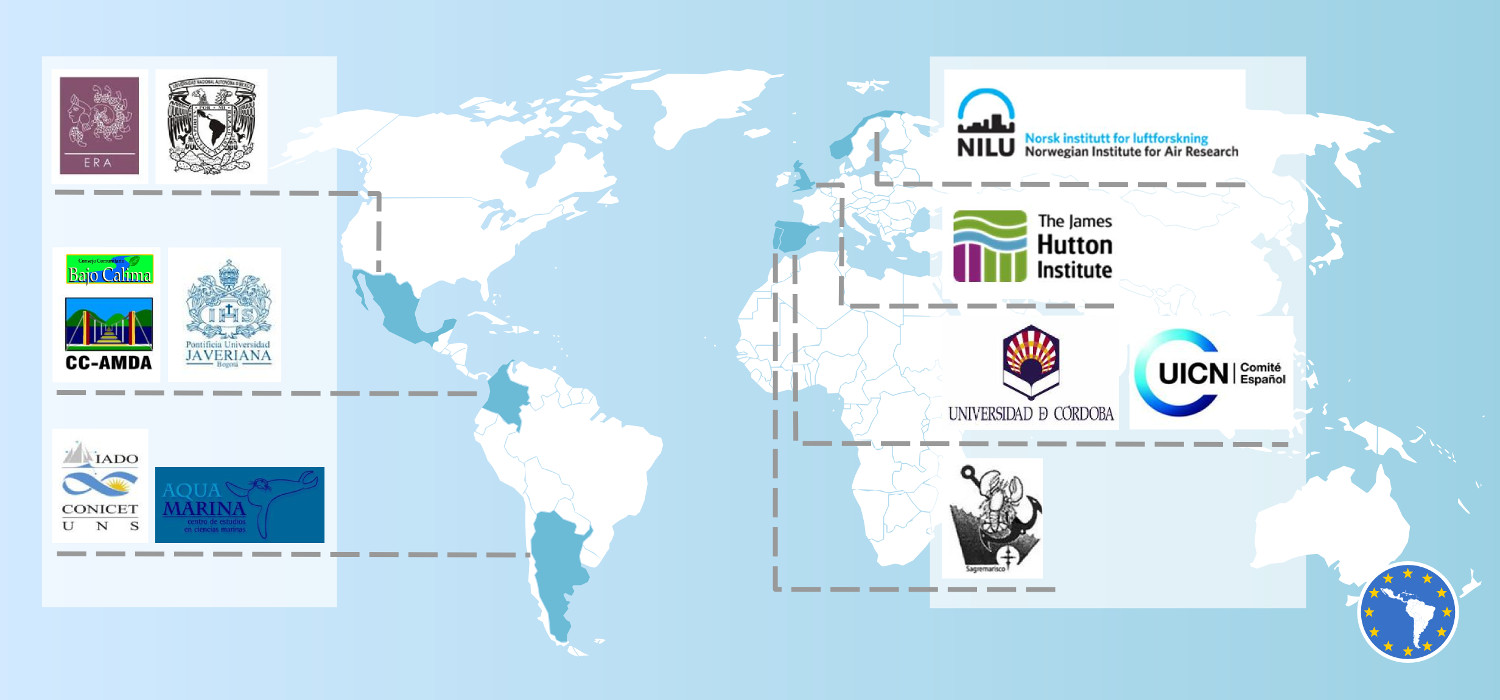 |
|
|
Partners list: |
|
|
|
Universidad de Córdoba, Córdoba, Spain |
|
|
Norsk Institutt for Luftforskining, Norway |
| The James Hutton Institute, Aberdeen, United Kingdom | |
| Sagremarisco-Viveiros de Marisco Lda, Faro, Portugal | |
| Pontificia Universidad Javeriana, Bogotá, Colombia | |
| Universidad Nacional Autónoma de México, Mexico DF, México | |
| Consejo Nacional de Investigaciones Científicas y Técnicas, Bahía Blanca, Argentina | |
| Fundación Aquamarina-CECIM, Bahía Blanca, Argentina | |
| Consejo Comunitario de la Comunidad Negra de la Cuenca Baja del Río Calima, Colombia | |
| Estudios Rurales y Asesoría Campesina Asociación Civil, México DF, México | |
|
Comité Español de la UICN, Cantabria, España |
|
|
University of Córdoba |
|
In collaboration with Latin American partners, the most relevant projects are KASWARMI (6FP) and DELIVER (6FP). UCO has lead and participated in different ALFA programs and CYTED Networks. UCO researchers included in COMET-LA are members of the Departaments of Agricultural Economics and Forestry. They have participated in the following international projects: XEROCHORE: An Exercise to Assess Research Needs and Policy Choices in Areas of Drought (7FP), CAPIRE Assessing the multiple impacts of the Common Agricultural Policies on Rural Economies (7FP), MELIA Mediterranean dialogue on integrated water management (6FP), AQUAMONEY Development and testing of practical guidelines for the assessment of environmental and resource costs and benefits in the WDF (6FP), International Impact Assessment of Agriculture Knowledge, Science and Technology for Development (World Bank), Evaluation of rural development experiences in Latin America (InterAmerican Development Bank), Education for Rural Development (UNESCO and FAO), Analysis of the public policies influence in the management of water in agriculture: Incertitude, Climate Change and WDF (Spanish Ministry of Science and Innovation), CLIMBE: Climate Change and biodiversity loss: the effects on ecosystem (BBVA Foundation).
|
|
UCO team |
|
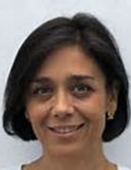 María del Mar Delgado SerranoCOMET-LA is leaded by Prof. Mª del Mar Delgado, from the University of Córdoba. She has participated in different research and education international projects funded by multilateral organisms and international organizations such as UNESCO, FAO, IADB, UNDP, World Bank, and have ample working experience in Latin America. Her research background has focused on development policies, sustainability and rural development. At present, she concentrates her effort in linking social and environmental perspectives in the analysis of current problems and in connecting science and research to society.  Pepa Ambrosio AlbaláPepa is a PhD candidate interested in the psychological and social dimensions of risk and climate change. Her research focuses on risk perception and communication and public understanding of climate change. She has broad interest in understanding how the idea of climate change is individually and collectively constructed and how climate change messages out of scientific results are conveyed to raise behaviour change. Pepa has previously worked in the field of rural development exploring urban-rural migration movements and she has developed her career within an international setting. She has a BSc in Sociology awarded by the University of Salamanca (Spain) and a joint International MSc in Rural Development, Wageningen University. 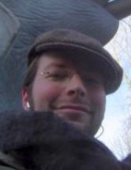 Pieter VanwildemeerschPieter, a Belgian forestry engineer, has been working in different projects in leading positions since 2007, gaining work experience in developing, implementing and evaluating development projects, focusing in the field of forestry and natural resource management. He has a broad understanding and knowledge ranging from general administrative and coordinating tasks, to technical supervision (inventories, GIS, etc.) and the development of participatory techniques and training modules. He has the necessary international, hands-on NRM experience and cultural sensibility through his several projects abroad like in Afghanistan or Rwanda. He provides methodological support in participatory techniques like stakeholder mapping and prospective analysis. 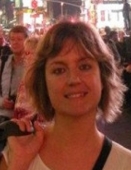 Cecilia RiccioliCecilia graduated from University of Florence with a BSc in Science and Technology of Food at the University of Florence. She was awarded a PhD from the University of Córdoba conducting a study on hyperspectral techniques for food security purposes (SAFEED European Project, VI Framework Programme). During the investigation she has had the opportunity to visit several European research centers and to carry out scientific studies published in international journals. She also has background in international development cooperation. She formerly worked for a project on cooperation for development in Ecuador and Peru and as development project manager in Spain. 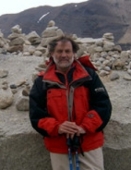 Rafael M. Navarro CerilloRafael es Dr. Ingeniero de Montes por la Universidad Politécnica de Madrid, y actualmente investigador responsable del Grupo de Evaluación y restauración de sistemas agrícolas y forestales cuyas actividades principales están centradas en el estudio de sistemas forestales, selvicultura, restauración y aplicación de nuevas tecnologías al estudio de en ambientes Mediterráneos y tropicales. Ha realizado estancias en centros de investigación en la Universidad de Missouri-Columbia, Universidad de Berkeley, Instituto Agronómico Hassan II de Rabat, Land Development Authority-Israel, Universidad de Murdoch (Australia), y ha participado en varios proyectos europeos. Estas colaboraciones han dado lugar a varias publicaciones en revistas internacionales (Environmemtal Management, Journal of Arid Environments, Forest Ecology and Management, Annals of Forest Science, Ecological Engineering, Remote Sensing of Environment, etc.). 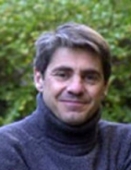 Julio BerbelJulio Berbel Vecino , Catedrático de la Universidad de Córdoba, Doctor Ingeniero Agrónomo y Master (M.A.) Agricultural Economics (1986). Su actividad reciente se ha centrado en la economía agraria y ambiental y ha participado activamente en la implementación de la Directiva Marco de Aguas en España y Europa así como en la elaboración de Planes Hidrológicos de Demarcación. En su producción académica destacan la publicación de más de 100 publicaciones internacionales y 50 proyectos y convenios de investigación. Ha participado en la gestión de empresas agroalimentarias (QUASH, SA, Bodegas Nueva Andalucía, Mercacordoba) y de servicios ambientales (Biomasa del Guadalquivir, Sadeco). 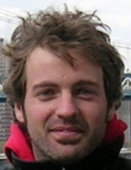 José Luis QueroJosé Luis es doctor por la Universidad de Granada y Profesor Ayudante Doctor en el Departamento de Ingeniería Forestal de la Universidad de Córdoba. Con el objetivo de abordar el estudio de los bosques con un enfoque multidisciplinar, se ha formado en las áreas de ecofisiología y demografía forestal, dinámica de comunidades vegetales y ciclos biogeoquímicos. Su formación tiene una fuerte base experimental y de modelización, fruto de los diversos centros de investigación nacionales e internacionales donde ha trabajado. Su actividad científica se plasma en 24 publicaciones SCI, entre ellas en las revistas Science y Nature. Ha participado en 10 proyectos de investigación, presentado numerosas comunicaciones a congresos nacionales en internacionales y ha publicado 10 capítulos de libro. |
|
Norwegian Institute for Air Research |
|
NILU has 40 years experience in ambient trace gas measurements, air quality modelling and management activities. NILU has been involved in several recent or current EC-research projects relevant to TRANSPHORM, such as MEGAPOLI, CITYZEN, EUCAARI, EUSAAR, CREATE, GMES-GATO, FORMAT, ASSET, FUMAPEX, Air4EU and ACCENT.
|
|
NILU team |
|
|
|
James Hutton Institute |
|
The JHI employs more than 600 scientists and support staff from a variety of natural and social science disciplines, making it one of the biggest research centres in the UK. It is based in two main sites in Scotland (at Aberdeen and Dundee) but works on projects across Scotland, Europe, and also in many developing countries. JHI places great importance on emphasising the relevance of its research to decision-makers at different scales and sectors, from policy-makers to land-managers. It therefore has particular expertise and interest in developing effective science-policy-practice interfaces. In case you wonder, the institute is named after James Hutton (1726 – 1797), who was a leading figure of the Scottish Enlightenment, an eighteenth century ‘golden age’ of intellectual and scientific achievements centred on Edinburgh. He is internationally regarded as the founder of modern geology and one of the first scientists to describe the Earth as a living system. His thinking on natural selection influenced Charles Darwin in developing his theory of evolution. |
|
JHI team |
|
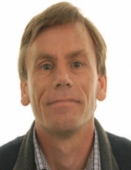 Iain BrownIain is a senior scientist with 20 years' experience working on the interactions between land use and water resources with climate change, biodiversity and ecosystem services. He is particularly interested in further implementing ecosystem-based adaptation to enhance resilience for present and future change in a range of different environments including for multifunctional agricultural and forestry land uses. As part of the research he has been using a range of different tools, including scenario analysis, integrated assessment, multi-criteria assessment, land capability and risk assessment. Previously he has worked for the UK Climate Impacts Programme, Tyndall Centre for Climate Change Research, and University of Glamorgan. He has also acted as an advisor to the UK and Scottish Government. 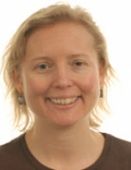 Kirsty BlackstockKirsty has a background in Sociology, with a joint honours degree in Sociology with Gender Studies from Edinburgh University and a PhD in Sociology from James Cook University, Australia. She is the theme leader for our Society, Institutions and Governance sub-group of the Social, Economic and Geographical Sciences group at The James Hutton Institute. She is one of the of the initial cohort for the newly established Young Academy of Scotland. Her current research interest include: governance, particularly public and stakeholder participation in environmental policy making and implementation. She has an associated interest in the use of 'tools' as deliberative boundary objects in decision making and evaluation processes. She generally favours mixed qualitative methods such as interviews, focus groups and participant observation 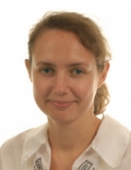 Kerry WaylenKerry is a researcher working in the Social, Economic and Geographical Sciences (SEGS) research group at the James Hutton Institute. Kerry has a background in both the natural and social sciences, some NGO experience, and field experience in several countries. She carries out interdisciplinary research that can inform and help improve policy and practice to conserve our environment and natural resources. She works using mixed methods across several projects, each relating to or more of a set of overlapping research interests: Community-based natural resource management; Scenarios for environmental decision-making; Ecosystem services, and the Ecosystem Approach as defined by the CBD; Stakeholder participation in environmental governance; Environmental policy, and science-policy interfaces for biodiversity and environmental management. 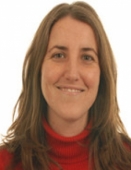 Julia Martin-OrtegaSenior environmental economist , has an interdisciplinary background in environmental sciences and economics, with an emphasis on environmental valuation and a growing interest in qualitative analysis. Graduated as Doctor in the University of Cordoba (Spain), Julia joined the James Hutton Institute in September 2010, after a two years research stay in the Institute for Environmental Studies (IVM) of the VU University in Amsterdam and a postdoc in Spain. Her research focuses on the understanding of the relations of society and individuals with ecosystem services, with an specialization on water ecosystem services. Her work covers three main research lines: 1) Assessment of the impacts of changes in the ecosystem status on human welfare. 2) How can economic tools/principles be best applied to sustainable natural resources management?. and 3) How do global changes compromise the capacity of communities to use and enjoy ecosystem services and how these adapt to these changes? 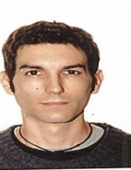 Juan Pablo Martin-del-MolinoJuan Pablo is a Social and Cultural Anthropologist, graduated with Masters in Sustainable Rural Development and in International Cooperation and Project Management. His work experience is based on collaboration with various NGOs in the design of development projects for Ethiopia and Mali. Although he had already carried out a study on Decentralized Cooperation in Castile and Leon, his first research activity on the field was developed at the University of Aberdeen, where he has worked with participatory techniques in the management of national parks in Zambia. His MSc dissertation looked at the role of Public Participation in the management of National Parks. Currently he is assisting on the development of methodologies for participatory scenario building at the JHI, and helping with communication and relationships with partners in the case studies. |
|
Sagremarisco-Viveiros de Marisco Lda. |
|
Sagremarisco-Viveiros de Marisco Lda. was founded in 1985 as a limited company at Sagres in SW Portugal. SGM operates at the interface between industry, education and scientific research and management providing: maintenance support for the local aquaculture industry and fishing fleet, as well as running trials in marine conditions for materials that are under development for maritime use; support with equipment and human resources for coastal field studies by both local and foreign universities, and other educational institutions: active participation in scientific research projects in the coastal zone; involvement with local, national and international institutions responsible for management of the coastal zone. Some examples of recent or current partnerships in European funded research projects: 2000-2003, Oceanographic applications to eutrophication in regions of restricted exchange (OAERRE); 2004-2007, Collective research on aquaculture biofouling (CRAB); 2007-Ongoing, “Science and policy integration for coastal system assessment” (SPICOSA); 2008-2012: European Space Agency “Technical assistance for the validation of MERIS marine products at Portuguese and oceanic and coastal sites”. At national level, SGM is a Consultant to the Administração de Região Hidrográfico (ARH) in the Algarve, Portugal on the implementation of the Water Framework Directive, and at the local level advises the Junta de Freguesia of Vila do Bispo and the Associação de Marisqueiros of Vila do Bispo on “The management of the stalk barnacle fishery along the SW coast of Portugal”. Since its inception, SGM has consulted on offshore aquaculture and is currently licensed with a partnership to install a “long line” system for offshore bivalve culture at Sagres. |
|
PUJ School of Environmental and Rural Studies |
|
It conducts research projects in the natural sciences and mathematic areas, in social and human sciences, theology, health, education, economics, management, engineering, architecture, design, urban development, and arts. It runs an average of 120 research projects per year, 30% of which have external funding, and is part of 3 National Excellence Research Centers:
The Javeriana University ranks number one among private universities in Colombia for having the largest number of refereed journals. The Javeriana University was the first higher education institution in Colombia to be awarded, for its high quality level, institutional acreditation for a period of eight years by Resolution 1320 of June 12th 2003, of the Ministry of National Education. Today, only 16 universities in Colombia have been granted said recognition. The University has a total of 27 undergraduate programs with high quality accreditation, and other ten programs are now in the more advanced accreditation process stage.In graduate programs, quality is acknowledged through the Qualified Registries. The University has156 graduate programs with Qualified Registries
|
|
PUJ team |
|
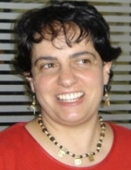 María Adelaida Farah QuijanoProfesora titular y directora del Departamento de Desarrollo Rural y Regional de la Facultad de Estudios Ambientales y Rurales de la Pontificia Universidad Javeriana. Miembro del grupo de investigación "Institucionalidad y Desarrollo Rural". PhD. en Estudios del Desarrollo, University of East Anglia, U.K. Magíster en Desarrollo Rural y Economista, Pontificia Universidad Javeriana. Sus áreas temáticas de trabajo académico son: Género y desarrollo rural, Nueva ruralidad, Institucionalidad rural, Diagnóstico y formulación participativa de proyectos productivos y rurales, Investigación y uso de herramientas participativas, descentralización y análisis institucional rural. 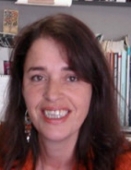 Diana Lucía Maya VélezDirectora de la Maestría en Desarrollo Rural y Profesora Asistente del Departamento de Desarrollo Rural y Regional de la Facultad de Estudios Ambientales y Rurales de la Pontificia Universidad Javeriana. Miembro del grupo de investigación "Institucionalidad y Desarrollo Rural". Magíster en Desarrollo Rural, Pontificia Universidad Javeriana. Socióloga, Universidad Nacional de Colombia. Sus áreas temáticas de trabajo académico son: Género y desarrollo rural, Diagnóstico y formulación participativa de proyectos productivos, Investigación y uso de herramientas participativas, y Desarrollo rural y nueva ruralidad. 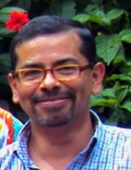 Cesar Enrique Ortiz GuerreroProfesor Asociado del Departamento de Desarrollo Rural y Regional de la Facultad de Estudios Ambientales y Rurales de la Pontificia Universidad Javeriana. Coordinador del grupo de investigación "Institucionalidad y Desarrollo Rural". PhD. en Planificación Regional, Universidad de Waterloo, Canadá. Magíster en Desarrollo Rural, Pontificia Universidad Javeriana. Ingeniero Zootecnista y Magíster en Zootecnia, Universidad de la Amistad de los Pueblos, Rusia. Sus áreas temáticas de trabajo académico son: Políticas y planeación para el desarrollo rural territorial, Centros urbanos rurales, desarrollo y planeación municipal sostenibles, Ecología política, Sistemas socio-ecológicos y conflicto ambiental, y análisis de la Producción de cultivos ilícitos en América Latina.  Daniel Castillo BrievaDirector de Investigaciones de la Vicerrectoría de Investigación de la Pontificia Universidad Javeriana. Profesor Asociado del Departamento de Desarrollo Rural y Regional de la Facultad de Estudios Ambientales y Rurales de la Pontificia Universidad Javeriana. Miembro del grupo de investigación "Institucionalidad y Desarrollo Rural". Doctor en Geografía Humana, Económica y Regional, Universidad Paris Ouest Nanterre la Defense, Francia. MPhil. en Dinámica de Sistemas, Universidad de Bergen, Noruega. Especialista en SIG. IGAC-Universidad Distrital. Geólogo, Universidad Nacional de Colombia. Sus áreas temáticas de trabajo académico son: Acción colectiva, análisis institucional y gobernabilidad en sistemas socio-ecológicos, y Modelamiento dinámico, y de acompañamiento (ComMod), para el estudio y la intervención en sistemas socio-ecológicos. 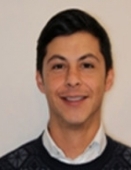 Pablo Andrés Ramos BarónProfesor de cátedra del Departamento de Desarrollo Rural y Regional de la Facultad de Estudios Ambientales y Rurales de la Pontificia Universidad Javeriana. Candidato a doctor en doctor en estudios y gestión del conflicto. Magíster en Desarrollo Rural y ecólogo de la Pontificia Universidad Javeriana. Miembro del grupo de investigación "Institucionalidad y Desarrollo Rural". Sus áreas temáticas de trabajo académico son: Cooperación y comunidad con énfasis en la conservación de recursos naturales, aspectos socio-ambientales desde la perspectiva ecológica, económica y social, análisis de la racionalidad para el manejo de recursos naturales, trabajo de campo y diseño de ejercicios de economía experimental, Diagnostico Rural Participativo (DRP) y modelamiento de sistemas dinámicos con comunidades, y análisis de problemática ambiental desde la perspectiva comunitaria y de género. 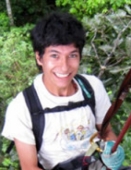 Bryann Esteban Avendaño UribeInvestigador junior becario de Colciencias. Biólogo y Ecólogo de la Pontificia Universidad Javeriana, con estudios en estadística y modelamiento dinámico en la misma universidad. Tiene experiencia en el desarrollo de metodologías para el trabajo con comunidades rurales en temas de uso y manejo de la biodiversidad en Colombia. Sus áreas temáticas de trabajo académico son: Modelamiento de sistemas socio-ecológicos, Planeación y análisis de Socio-Ecosistemas, Innovación social y desarrollo rural, y Apropiación social de la ciencia.  Lina Niyiba Pinzón MartínezProfesional en Ciencia Política y Sociología de la Pontificia Universidad Javeriana. Perteneció a grupos de investigación como: Ciencia Política y Conducta Humano, Modelamiento Multi-agente y Jóvenes investigadores. Áreas de interés:Política PúblicaPlaneación y Desarrollo rural y humano.Modelamiento de sistemas socio-ecológicosConflicto Armado y Reparación a víctimas .Gobernanza[re] construcción de la identidad y la relación cuerpo, territorio e identidad |
|
Universidad Autónoma de México |
|
Issues such as water use, forestry, social participation in ecological systems, energy and others are part of the research work carried out by academics and graduate students. The Faculty also participates in a branch of a Doctoral Programme on Environmental Economics and Sustainable Development at the National University La Agraria in Lima, Peru. This programme is designed to address the needs of creating human capital for the Andean Region. Interesting and useful theses are emerging of such academic enterprise. It should be mentioned that the main emphasis of all the work is to establish an interdisciplinary approach to environmental problems although the economic variables are place as important ones. More than ten researchers and 60 students are involved in this area of knowledge.
|
|
UNAM team |
|
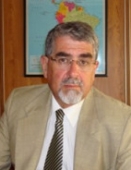 Roberto I. Escalante SemerenaPostdoctorate studies at the Latinamerican Study Centre at the University of Cambridge, United Kingdom. Philosophy Doctor in Rural Development by the University of London (Wye College). Awarded with Honoris Causa PhD degree by the Catholic University of Angeles in Chimbote. Master in Agrarian Development from the University of London (University College London) and graduated from the National Autonomous University of Mexico (UNAM) with a BA in Economics. Currently, Roberto is a full-time researcher and professor in Agricultural Economics and Rural Development at the Postgraduate Economics Department (UNAM). He was Director of the Faculty of Economics (UNAM) from 2002 to 2010. Now, Roberto is the General Secretary of Latin America and Caribbean Universities Organization (UDUAL). 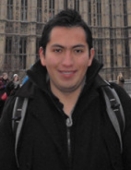 Saúl Basurto HernándezSaul is a Master of Science in Environmental and Natural Resource Economics from the University of Birmingham (United Kingdom) and graduated from the National Autonomous University of Mexico (UNAM) with a BA in Economics. He has worked in several research projects related with the impact of climate change on Mexican agriculture. Currently, he is a lecturer of the Faculty of Economics at UNAM. His recent studies have been focused on environmental services valuation, sustainable development, agriculture, and natural resource management. Likewise, he possesses a vast knowledge on designing and running econometric models. 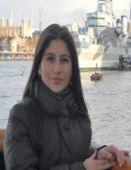 Alejandra Xóchitl Cruz BayerAlejandra is an undergraduate student of the Faculty of Economics (National Autonomous University of Mexico). She has worked in some research projects related with Community management of natural resources and environmental issues. Likewise, she possesses a vast knowledge on participatory techniques application. Her research is focussed on the application of Elinor Ostrom's methodology to identify robust systems. |
|
Instituto Argentino de Oceanografía |
|
|
|
IADO team |
|
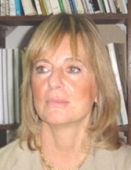 Maria Cintia PiccoloMaria Cintia is Meteorologist from the Universidad de Buenos Aires, Argentina and PhD in Oceanography from Old Dominion University, Norfolk, Virginia, USA. She is Professor in the Department of Geography at the Universidad Nacional del Sur and Senior Researcher at the National Council for Scientific and Technical Research (CONICET). She is currently the General Secretary of Science and Technology, Universidad Nacional del Sur. For 11 years she was director of the Argentine Institute of Oceanography (IADO). She has published extensively on the subject of ocean-atmosphere interaction, climate variability and its effects on lakes, estuarine circulation and dynamics, among others. 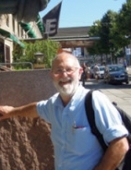 Gerardo PerilloPhD in Oceanography and Licenciate in Geological Sc.. Senior Researcher CONICET, Argentine Institute of Oceanography, Deputy Director, Professor of Marine Geology (UNS) . Professor at the universities of Quèbec, Concepción, Algarve and Cadiz. Main research topics are water-sediment-biology interaction processes, and geomorphological evolution of coastal and inland environments. He established a program to develop his own instruments resulting in the Estaciones de Monitoreo Ambiental Costero and the construction of the first buoy in the country for environmental monitoring. Member of various committees of international organizations. Author and editor of 14 books and special issues of journals, 192 publications in oceanography, sediment transport, physical-biological processes among other subjects, a documentary and popular science works. 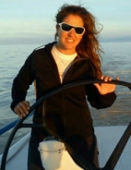 Valeria VitaleValeria is a student of Economics at UNS, sailor and motor yacht captain, and sailing coach. She is a founding and active member of the NETWORK OF YOUNG LEADERS FOR MARINE CONSERVATION. She is currently doing her thesis about the artisanal fisheries in the Bahia Blanca Estuary. She is a member of COMET- LA Argentina team, in the socio economic area and for the NGO AQUAMARINA collaborate in the area of outreach and education. My passion is sailing, which is a source of motivation to collaborate on conservation in harmony with the progress. 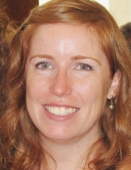 M. Luján BustosM. Luján Bustos is PhD in Geography (2012) at the Universidad Nacional del Sur (UNS). Her studies focus on morphological changes of sandy beaches and coastal integrated management associated to urbanized areas. She works at Instituto Argentino de Oceanografía and received doctoral (2007-2012) and currently postdoctoral fellowships from the Consejo Nacional de Investigaciones Científicas y Técnicas (CONICET). She is a teaching assistant "Introducción a la Oceanografía" at UNS and teached the course "Dynamics of beaches and coastal monitoring" for rangers of Pehuén Co-Monte Hermoso and environmental groups in the towns of Ostende, Villa Gesell and Claromecó. Within the Argentine group of COMET-LA project she is the contact person besides doing the research for the project.  Facundo ScordoFacundo Scordo is Licenciate in Environmental Science (Universidad de Buenos Aires) and Technician in Agricultural Production (Escuela Técnica de Producción Agropecuaria, Universidad Nacional del Sur (UNS)). He worked in environmental management in the private industry until 2013. He is currently pursuing a PhD in Geography in the Departamento de Geografía y Turismo (UNS). The research is directed by Drs. Gerardo M. E. Perillo and M. Cintia Piccolo, and funded by a fellowship from the COMET-LA and SAFER projects. His workplace is the Instituto Argentino de Oceanografía. In the COMET-LA project is a student fellow interested in climate change, social perception and community resource management.  María Belén BertoniBelén graduated from the Universidad de Buenos Aires with a degree in Socio-Cultural Anthropology and she is a PhD candidate.She has previously worked in various socio-cultural fields: intercultural education and childhood and rural issues. Nowadays, she is working on migrations movements and health impacts.As regards to Climate Change, she is interested on the local community's knowledge about how the climate change and the socio-economic activities are producing dramatic effects on the ecological resources; and which are the different meanings that local communities assign to their behaviours and activities that have a daily/constant impact on the environmental context. 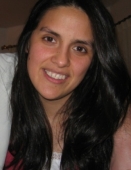 María Andrea Huamantinco CisnerosMaría Andrea Huamantinco Cisneros is Guide of Tourism (2001), Licenciate in Geography (2007) and PhD in Geography (2012) from Universidad Nacional del Sur (Bahía Blanca, Argentina). Her research is orientated to the study of the effects of the climate variability over the coastal morphology and climate comfort associated to urbanized coastal environments. Presently, she works on the impact of extreme events in coastal zones. She received doctoral and postdoctoral fellowships awarded by Consejo Nacional de Investigaciones Científicas y Tecnológicas (CONICET) and she works at Instituto Argentino de Oceanografía (IADO). She teached the course "Beach dynamics and coastal monitoring" in Villa Gesell, Ostende and Claromecó coastal cities. She is part of the argentine research group of COMET-LA project. 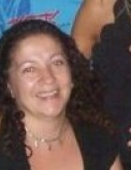 Silvia LondonSilvia London is PhD in Economics from the Universidad Nacional del Sur and is currently an Associate Professor at the Department of Economics of the same university. Dr. London is an Independent Researcher of CONICET (IIESS). Her areas of interest are: Development and Economic Growth, Environment and Development, Institutional Analysis, and the Role of Education in Economic Development. Dr. London is the head of the PIP-CONICET project: Growth and Development Traps in Latin America, and of the PGI project The Role of Health and Education in the Economic Development. In addition to her participation in the COMET project she is also member of the SAFER project (funded by IAI). 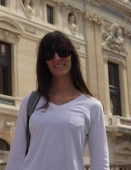 Mara RojasMara Rojas es Doctora en Economía (2011) en la Universidad Nacional del Sur (UNS). Es Asistente de Docencia en Desarrollo Económico en la misma institución y colabora con los cursos de postgrado en Macroeconomía y Crecimiento Económico en la UNS y el Programa de Postgraduación del Banco Central de Guatemala. Desde el 2006 y hasta el 2013 fue becaria doctoral y postdoctoral del Consejo Nacional de Investigaciones Científicas y Técnicas (CONICET). Sus investigaciones se centran en la relación entre capital humano, capital social, instituciones y desarrollo, tópicos en los cuales ha publicado varios artículos académicos. Actualmente, la Dra. Rojas es parte del grupos argentino de COMET-LA y, paralelamente, del proyecto Sensing the Americas' Freshwater Ecosystem Risk (SAFER - IAI). 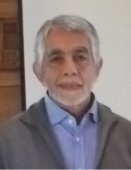 Juan Carlos PascaleJuan Carlos Pascale is Architect (1973 - National University of La Plata) and Master in Tourism Destination Management (2008 - School of Hospitality and Tourism at the University of Barcelona, Spain). Since 1984 he is a professor-researcher in the Tourism area of the Geography and Tourism Department of Universidad Nacional del Sur (Bahía Blanca, Argentina). In 2005 he participated in the international cooperation project (URBAL) of the municipality of Bahia Blanca. He participated in research projects to contribute to the development of tourism in municipalities in the region. In Monte Hermoso, he integrated teams to study: Demand, tourism sustainability indicators and the Tourism Development Plan, among others. 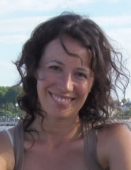 Mariana ZilioShe is PhD in Economics from the Universidad Nacional del Sur and member of the Institute for Economic and Social Research of the South, where she is currently developing her activity as Assistant Researcher of the National Council of Scientific and Technical Research (CONICET). Throughout his career she has worked on Environmental Economics and Natural Resources and she has several national and international publications on these topics. Currently, his research plan is aimed to designing and analyzing the implementation of policy for adaptation to climate change in the area of the Bahía Blanca Estuary. 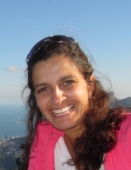 Marina RecaldeMarina Recalde isPhD in Economics (2010) from the Universidad Nacional del Sur (UNS). She is Adjunct Researcher from the Consejo Nacional de Investigaciones Científicas y Técnicas (CONICET) and the Programa de Medio Ambiente y Desarrollo de la Fundación Bariloche (Argentina). She Works in the branch of Energy and Climate Change, and has worked as a teacher assistant in the subject of Energy Economics in the UNS and a postgraduate teacher in the Diploma Superior en Derecho y Economía del Cambio Climático, FLACSO Argentina. Currently, Dr. Recalde is part of the COMET-LA Argentine group. 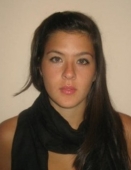 María María Ibañez MartinMaría María Ibañez Martin is Licenciate in Economics (Universidad Nacional del Sur). She is currently a CONICET Doctoral Fellow working on issues of social inclusion, segmentation and educational inequality. However, her academic interests are broad, encompassing institutional, econometric and environmental issues. She is also teaching assistant in the Department of Economics at the Universidad Nacional del Sur.The COMET-LA project consists of issues that are of great interest to the scholar, so that participation in the project has been an extremely important aspect in her training. 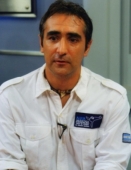 Guillermo Luis FidalgoGuillermo Luis Fidalgo is Ranger Provincial, guide tourism and journalist. He has a specialization in oceanography and marine resources, Fundación Universitaria Iberoamericana FUNIBER - Miguel de Cervantes European University (Spain). A diploma "specialist of environmental management and territorial planning", CIEFA "Center Ibero-American specialized in environmental training" (Peru). He graduated international in coastal zone management, University of Guadalajara (Mexico). Participating in activities of environmental education and conservation of marine mammals. He received several awards for different organizations as UNESCO, Foundation Cherry Breitman, municipality of Bahía Blanca, The Oustanding Young Persons, Asociación Argentina de Televisión por Cable, among others. He has presented projects of Ordinances relating to the facility. 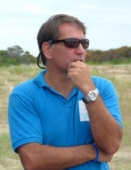 Pablo BordinoPablo Bordino is a biologist from the University of Buenos Aires (Argentina) with Postgraduate studies in Coastal Managementt at Nova South Eastern University and Conservation Biology at Columbia University (USA). He is currently Director at Fundación AquaMarina and Senior Project Leader at the EcoHealth Alliance and CERC/The Earth Institute at Columbia University. Pablo´s research is focused on Aquatic Ecology, Natural Economy, Fisheries, and Coastal Management. In 2001, he was one of the shortlisted candidates to receive the prestigious "Whitley Award", and in 2002 he received the "WildInvest Continuation Award for Conservation of Nature". He is currently member of the Scientific Committee at IUCN SSC CSG. 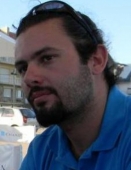 Leonardo BerninsoneLeonardo Berninsone is a biologist from the Universidad de Buenos Aires (Argentina), and currently a student at Università di Bologna (Italy). He has been involved in research and conservation of marine mammals as well as seabirds, sea turtles and artisanal fisheries along the coast of Buenos Aires Province during the last decade. He has also been an assistant intern at the Sarasota Dolphin Research Program at the Mote Marine Laboratory in Florida (USA). Currently, he is Project Leader at Fundacion AquaMarina. His interest is to link science with community, focusing both on research and environmental education. |
|
Aqua Marina, Centro de Estudios en Ciencias Marinas |
|
AquaMarina has experience in fisheries and coastal management developing socio-economic studies to understand the coastal fishery, evaluating new approaches for coastal management in urbanized beaches, providing scientific knowledge and resources to develop management plans in coastal protected areas, developing opportunities to improve local human resources and capacity building, and developing new approaches on informal environmental education in cooperation with local communities. AquaMarina is focused on saving biodiversity in human-dominated bioscapes where ecological health is most at risk because of habitat loss, species imbalance, pollution and other environmental issues caused by human-induced change. It formally has agreements of cooperation with National and International Academic Institutions as well as County, Provincial and Federal agencies. It is also a member of the Binational Uruguay-Argentina Biodiversity Conservation Taskforce for the La Plata estuary (PNUD/GEF/RLA99/G31) and also member of the Forum for the Conservation of the Patagonian Sea,. AquaMarina currently runs 5 conservation-research projects in applied science with support from national and international funding organizations.
|
|
Aqua Marina team |
|
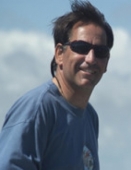 Pablo BordinoPablo Bordino is a biologist from the University of Buenos Aires (Argentina) with Postgraduate studies in Coastal Managementt at Nova South Eastern University and Conservation Biology at Columbia University (USA). He is currently Director at Fundación AquaMarina and Senior Project Leader at the EcoHealth Alliance and CERC/The Earth Institute at Columbia University. Pablo´s research is focused on Aquatic Ecology, Natural Economy, Fisheries, and Coastal Management. In 2001, he was one of the shortlisted candidates to receive the prestigious "Whitley Award", and in 2002 he received the "WildInvest Continuation Award for Conservation of Nature". He is currently member of the Scientific Committee at IUCN SSC CSG. 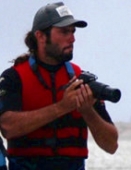 Leonardo BernissoneLeonardo Berninsone is a biologist from the Universidad de Buenos Aires (Argentina), and currently a student at Università di Bologna (Italy). He has been involved in research and conservation of marine mammals as well as seabirds, sea turtles and artisanal fisheries along the coast of Buenos Aires Province during the last decade. He has also been an assistant intern at the Sarasota Dolphin Research Program at the Mote Marine Laboratory in Florida (USA). Currently, he is Project Leader at Fundacion AquaMarina. His interest is to link science with community, focusing both on research and environmental education. |
|
Consejo Comunitario de la Comunidad Negra de la Cuenca Baja del Rio Calima |
|
The Council has developed a series of principles and values to govern the territory including the following:
|
|
CCCNCBRC team |
|
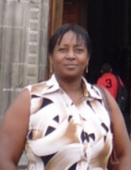 Lucila MartínezLucila es técnica en trabajo social del Instituto Técnico Empresarial Bolivariano con sede Buenaventura y técnica en preservación de recursos naturales del Servicio Nacional de Aprendizaje SENA, Colombia. Fue representante legal de AMDA desde el año 2002, manteniendo su cargo por tres periodos consecutivos. Cuenta con amplia experiencia en la dimensión social y ambiental para el desarrollo de las comunidades afrodescendientes, participando activamente en la visibilización de los procesos del consejo tanto en el uso, manejo y conservación de los recursos naturales del territorio, como en la defensa de los derechos humanos de su comunidad. Actualmente se desempeña como Asesora del consejo comunitario AMDA y en sus temas de interés está la promoción de actividades para rescatar la cultura y las prácticas tradicionales, además de la construcción de identidad en las comunidades. 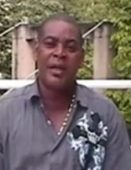 Manuel RiascosDesde el 2011 es el representante legal de AMDA. Ha sido miembro activo en el Consejo y en la Junta Directiva desde hace 12 años. Su primer periodo fue como coordinador de Infraestructura y Medio Ambiente; en un segundo periodo fue el Coordinador General del Consejo Comunitario y en el tercer periodo, fue el primer asesor general del Consejo Comunitario. Ha realizado diplomados y cursos en gestión de recursos naturales y política pública. Desde su vinculación en la directiva del consejo, ha trabajado en la defensa de los derechos humanos de las comunidades de río en zona rural de Buenaventura. Su principal interés está en visibilizar el consejo comunitario como un caso ejemplar en la conformación de organizaciones de la sociedad civil en Colombia, especialmente en el manejo tradicional de los recursos naturales y el rescate de identidad dentro de las comunidades 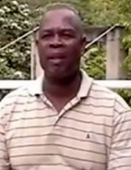 Sebastián Moreno MurilloEs el representante legal del consejo comunitario BACA. Cuenta con amplia experiencia en cargos de la junta directiva del consejo comunitario. Ha realizado cursos y diplomados en gestión, educación y política para la zona rural. Se ha desempeñado como líder comunitario en diferentes procesos de resolución de conflictos sociales y ambientales, su participación política ha estado de la mano del reconocimiento que ha tenido en las comunidades como una persona responsable, influyente y con visión. Su principal interés está en la promoción del "Buen Gobierno" de los recursos naturales en su territorio, la proyección de las comunidades en mercados de ecoturismo, agroforestería, manejo forestal y de los recursos no maderables, y venta de productos tradicionales. 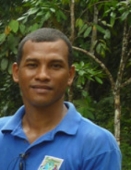 Rafael Arroyo PonceRafael es biólogo de la Universidad del Valle, y master en Ciencias Ambientales con énfasis en desarrollo sostenible y Cambio Climático de la Universidad de Manizales, Colombia. Actualmente es director ejecutivo de la Fundación Social Agroambiental Pacífico Vivo (FUNDAPAV). También se desempeña como docente de extensión rural en el servicio nacional de aprendizaje SENA y cuenta con amplia experiencia de investigación ambiental y biológica en los territorios de los consejos comunitarios Alto y Medio Dagua, Bajo Calima y Bahía Málaga, entre otros. Sus áreas de interés son el Cambio Climático, el desarrollo de alternativas sostenibles de prácticas pesqueras, el recurso hídrico y la biodiversidad como componentes de análisis ecosistémico del territorio de los consejos comunitarios. 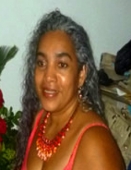 Elizabeth Alfonso RincónGerente de la empresa Representaciones Logistic Express Ltda. Presidente de la Junta directiva de la Fundación Social Agroambiental Pacifico Vivo "FUNDAPAV". Especialista en Gerencia Ambiental y Desarrollo sostenible Empresarial, administradora de empresa de la Universidad Nacional UNAD, y Técnico Profesional en Comercio Exterior del SENA. Como parte del equipo de Fundapav ha venido apoyando y realizando acompañamiento a los diferentes Consejos Comunitarios, especialmente a los Consejos de Alto y Medio Dagua, Bajo Calima, Córdoba San Cipriano y Santa Elena en los diferentes procesos de fortalecimiento organizativo. Actualmente con la comunidad se encuentra coordinando los proyectos de Fortalecimiento de la Capacidad Productiva de un grupo de 60 Mujeres en el Consejo Comunitario de Alto y Medio Dagua y el proyecto para el fortalecimiento Etno cultural. Sus áreas de Interés son: Administración y uso sostenible de los recursos naturales, y fortalecimiento organizativo en las comunidades . 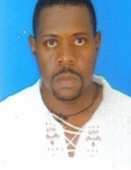 Oscar Orlando Hernández NoviteñoAdministrador Ambiental y de los Recursos Naturales Renovables. Universidad Santo Tomas de Aquino. Técnico Profesional en Agropecuaria. Técnico profesional Agropecuario y Especialista en Agroecología del Instituto ITA – Buga. Magister en Desarrollo Rural, Pontificia Universidad Javeriana. Instructor del área de agropecuarias, Recursos Naturales y Medio Ambiente del Servicio Nacional de Aprendizaje, SENA. Miembro fundador de las ONGs, Fundación Social Agroambiental Pacifico Vivo FUNDAPAV, y fundación Ecobios. Asesor de los consejos comunitarios de las comunidades negras de Alto y medio Dagua, Córdoba San Cipriano y Santa Elena y el de la cuenca Baja del rio Calima. Acompañante en los procesos y realización de Estudios de Impacto Ambiental, formulación de planes de administración de recursos naturales, prospectivas para el bienestar y desarrollo en los territorios colectivos; igualmente en procesos de participación comunitaria para Consulta Previa. |
|
Estudios Rurales y Asesoría Campesina |
|
Since 1993, ERA have conducted 20 research projects, including 11 related with sustainable natural resources use and 9 addressing environmental services provision. ERA have facilitated interdisciplinary team working many times, including a Mexico and Central America consultation process to identify principles for sustainable biodiversity management, hosting a national process to develop Mexican standards for sustainable forest management under the Forest Stewardship Council framework, and a Meso-american training module on community forestry bringing together four times 20-members cohorts of young professionals from 8 Central and Latin American countries.
|
|
ERA team |
|
|
|
CEUICN |
|
|
|
CEUICN team |
|
|